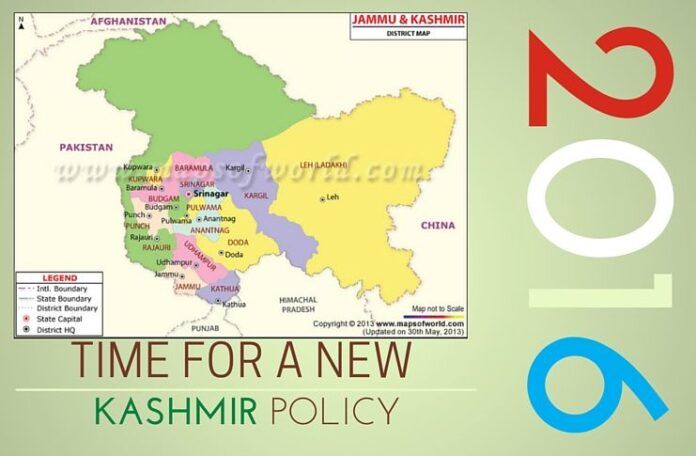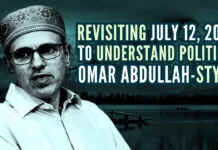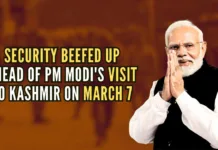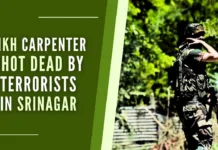
[dropcap color=”#008040″ boxed=”yes” boxed_radius=”8px” class=”” id=””]T[/dropcap]he death of Burhan Wani has brought Kashmir back to a 2010-like situation. The political and military efforts of last six years have come to naught. Peace in the valley is fragile and there is not much India can do to bring permanent peace to it. The national institutions are in any case giving their best to Kashmir and nothing more can be done for the state. The level of poverty in valley is very low in comparison to other states, yet the Central Government gives 90 per cent of its support in terms of grant whereas much poorer states like Bihar gets 65 per cent as grant for Central schemes. Kashmir is the best example that insurgency pays.
Kashmir has forgotten its Mahayana Buddhism and Shaiva Siddhanta; Saraswati, goddess of Knowledge, resides there.
Generally, it is assumed that a state with active insurgency will have a dysfunctional economy, poverty, extreme level of unemployment, etc. In spite of a high percentage of unemployment among Kashmir youth, the state is financially extremely well off. The traditional economy of Kashmir remains undisturbed except for few occasions when it faced blockages from Jammu region. It’s true that life in the valley is uncertain but it’s also true that it is not as difficult as it appears from outside. The state economy is mostly dependent on agriculture and cottage / handicraft industry, which is not impacted by the security situation.
Economic stability provides a cushion to all, including separatists and overground workers. Bread-and-butter issues don’t exist for average Kashmiris. One lives and earns where one is born. This provides immense flexibility to the separatists. It’s not desperation which drives people towards militancy; barring few cases of revenge, most insurgents are driven by something which is neither independence nor love for Pakistan.
[dropcap color=”#008040″ boxed=”yes” boxed_radius=”8px” class=”” id=””]K[/dropcap]ashmir is neither a military problem nor a political problem. It’s a civilizational problem, like Pakistan. Kashmir has forgotten its Mahayana Buddhism and Shaiva Siddhanta; Saraswati, goddess of Knowledge, resides there. But the Valley remembers and exalts Kashmiri Sufism and ignores the other great spiritual traditions. The problem of Kashmir is that like Pakistan, even if we agree to their every demand, they will not be satisfied. Strangely, they never reject money and goodwill from us.
However, the Kashmir population is diverse and includes tribals like the Gujjar, Bakarwal and Pahari and non-tribal Shia and Sunni. Political aspirations differ in each ethnic group. The Government of India has not given much credence to the political views of other groups and has been mainly focused on the Sunnis of the valley.
In the last one-and-a-half decades, a multi-layered security grid has been created in the State and security agencies have been successful in bringing down militancy to current levels. But the security grid has not been able to bring it to an end. Why?
The valley-based separatists have seen the limit of civilized military power. Even during the peak of insurgency (1990s) the Indian army has not behaved the way Turkish forces are behaving in Kurd regions of Turkey or the way the Saudi army dealt with protesting Shias in Bahrain. In its operation against Tahreek-e-Taliban Pakistan (TTP), the Pakistan army has used field artillery and levelled towns and villages before moving in. the Indian armed forces have always fought with minimum force (‘with one hand tied behind the back’). The separatists have been exploiting our minimalistic force policy to their benefit.
[dropcap color=”#008040″ boxed=”yes” boxed_radius=”8px” class=”” id=””]T[/dropcap]he existing policy on Kashmir needs to end. India can’t pursue a policy which doesn’t have any element of surprise for separatists. We need to shake their comfort zones. The debate on Kashmir needs to be restarted and Kashmir policy freed from military status quo. We need punitive military action for them to respect state power.
The public discourse on Kashmir issue is dominated by retired generals on the electronic media. They view the problem through a military angle alone. It’s time to get more divergent views. The Government need to diversify scholarship on Kashmir and to relook the current status-quoist policy. There is no need to solve the issue in haste. The reality is that separatists have better cards than the Government if both sides come to the table. Every attempt to dialogue with the separatists has failed because they have nothing to lose and are patiently managing the situation. It’s always New Delhi which pulls back from negotiations, losing face and giving moral victory to the separatists.
The Government needs to have a comprehensive look at the whole of Jammu and Kashmir. A detailed study of the political, cultural, economic and administrative issues of every region needs to be carried out by the Ministry of Home Affairs’ Kashmir section. A similar security assessment needs to be done by security agencies.
Only after careful, deliberate and detailed assessment should a new policy be formulated which should have enough flexibility for the agencies to give shocks and surprises to the separatists. It is the Government of India which should call the shots in the valley and not the separatists. Ultimately, it’s the Government of India which supports the anti-nationals in the valley.
The author is a Delhi based independent journalist.
- An interview withLt Gen Narsimhan - July 17, 2017
- Nation can’t pay for Mamata’s short sighted politics - July 8, 2017
- Time for New Approach to Afghanistan - June 14, 2017











Kashmir has to be a political solution and it should start with demography change which is the most important step.Workout ways to bring this,plenty of roads/dams/rail lines needs to be built.Let our ex servicemen get employment to build these infrastructure.have a dialogue with many groups within kashmiriyat especially shia,tribals and improve governance not the crooked ones which have ruled kashmir till now.Did the government at any time ask how the people of Jammu feel about governance?.In the meantime, workout a unified approach with all political parties within India on what the approach will be.In about 15 years time,we will have a situation to remove article 370 and bring the entire state within the ambit of Indian constitution.Work towards it.
Firstly the utmost hypocrisy that India is plagued with vis a vis P O K (where as actually India does not have the territory) by depicting the region in maps of India, reserving seats for parliament and assembly must end.
Either we take steps to reclaim the territory by using all means,at least keep repeating the resolve to do so in all available fora by all leaders or forget about it once and for all but for heaven’s sake don’t issue ad-hoc inconclusive statements.
Next identify the final entity with whom talks can be held within the ambits of the constitution.Then ask them with what they will be satisfied and abjure violence. Give them the same if acceptable to both.
Ask them to define in concrete terms what (the hell)they mean by’ Kashmiriyat’ as opposed to simple ‘Indian-ness’ or any other state’s self respect for that matter.
It must be unambiguously clarified in international fora that Pakistan is not a party to the matter as it has no ‘locus standii’.
If they still prattle about plebiscite let them refund all money spent on their decent living at the cost of other states in the past 70 years and conduct a pan Indian voting on the matter.
The question of article 370 should rise above political considerations and both central and state Govts should keep working towards national integration and not increasing differences.